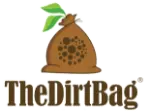

What’s the difference between compost and fertilizer? And which is the best choice for your garden? Knowing how to answer these questions might not be easy if you’re new to gardening.
Compost is a mixture of decomposed organic matter, like plant waste and manure, and it works to feed garden soil. Fertilizer, on the other hand, can be a blend of either organic or synthetic substances suited to feed garden plants.
Many gardeners have great success using compost, but plants can often benefit from the concentrated nutrients fertilizer contains. Here, we look at the pros and cons of both products to help you decide which on the best landscape materials for your garden.

garden fertilizer on gardeners hand
Compost offers a host of advantages to garden soil. The benefits of using compost include:
Promotes healthy microbe growth in the soil
Creates a nutrient-rich soil environment, enabling plants to feed themselves
Aerates the soil and allows it to retain more moisture
Helps keep weeds under control.
Boosts resistance to plant disease
The main drawback of using compost in the garden is that it takes time to make. However, that problem is easy to solve – simply buy bagged or bulk high-quality compost from a local landscape materials supplier.
Like compost, fertilizer also comes with several benefits. The advantages of using fertilizer to amend garden soil include:
Targets specific plant needs to encourage fast and healthy growth
Quickly alleviates deficiencies in the garden soil
Compensates for nutrients lost through water drainage
As for the negatives of using fertilizer? One is the risk of overloading the soil with nutrients. If a gardener reapplies fertilizer before the soil has time to absorb all of the nutrients, plants can experience poor growth. Organic fertilizer is preferred by many gardeners, as synthetic fertilizer can harm the surrounding environment.
As you can see, there are advantages and drawbacks to both compost and fertilizer.
Some gardeners say that compost is all anyone needs, as it contains microbes that encourage healthy plant growth. Others prefer to use fertilizer to supply plants with specific nutrients that may be lacking in the soil.
Often, however, the best solution is to use both. Compost works well with fertilizer, sponging up and storing the nutrients until they’re needed by the garden plants. Gardeners that go this route typically choose organic fertilizers over synthetic products, as the chemicals in the latter can discourage the beneficial microbe activity in compost.
With the many different soil amendments available, deciding which products to use in your garden can be a challenge. The best way to make a choice? Turn to a local expert in landscaping products – like the professionals at The Dirt Bag.
As a leading northern Utah supplier of high-quality bagged and bulk landscape materials, The Dirt Bag understands how to create a healthy soil environment that encourages plant growth and can offer advice on whether you should use compost, fertilizer or both in your garden. To learn more, or to schedule delivery, contact our West Jordan office today.